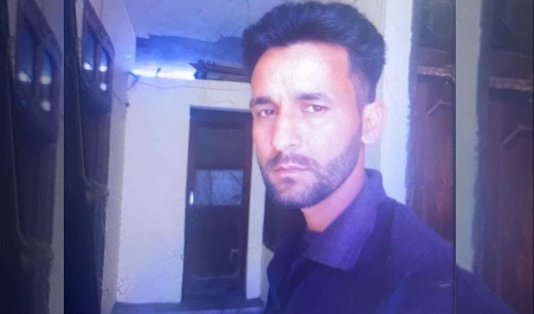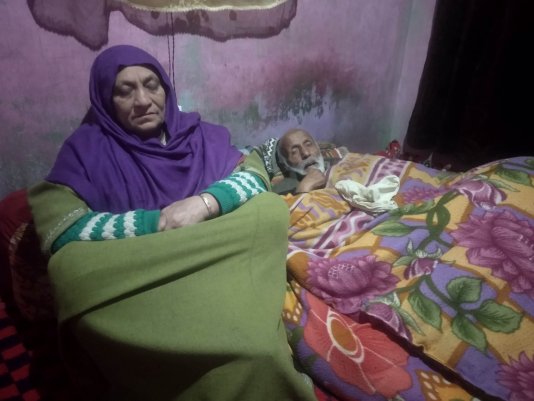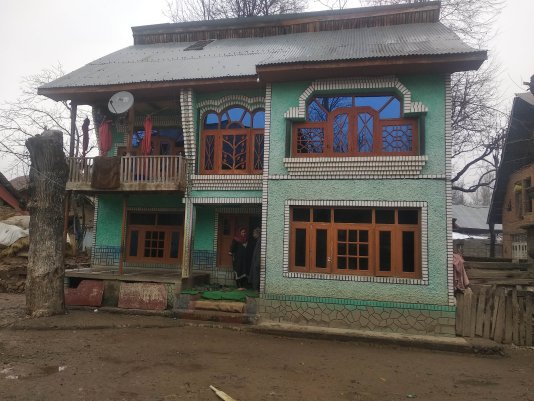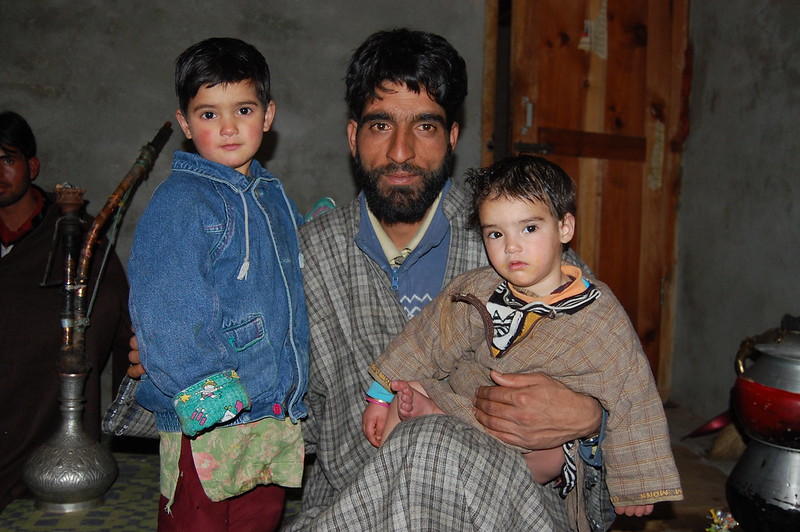- About
- Topics
- Picks
- Audio
- Story
- In-Depth
- Opinion
- News
- Donate
- Signup for our newsletterOur Editors' Best Picks.Send
Read, Debate: Engage.
| February 24, 2023 | |
|---|---|
| topic: | Political violence |
| tags: | #Kashmir, #political violence, #enforced disappearances, #human rights |
| located: | India |
| by: | Mir Aiyaz |
It has been more than two months since Khera Begum last saw her son, Abdul Rashid Dar, who was taken into custody by 41 Rashtriya Rifels (RR) soldiers in Indian-administered Kashmir.
On 15 December, 2022, an hour after the Isha prayers were concluded, Rashid's family heard repeated knocking on the main entrance door to their house in Kunan Poshpora, Kupwara district. Shabir Ahmad Dar, Rashid's older brother, unlatched the door and discovered scores of army men filling the courtyard; they told him the were searching for Rashid as part of some investigation.
Shabir, who works as a Special Officer in the local police department, inquired about the absence of police presence at the scene, which is mandatory when a civilian is apprehended by the army. According to Shabir, the town commander replied that the police have been informed about the matter.
At the time of the army's arrival, Abdul Rashid Dar, was having dinner alongside his bed-ridden father. The next day, Rashid was due to leave for the Indian state of Punjab in search for better job opportunities, a tradition many villagers in his area follow.
But the plan did not pan out as envisaged by Rashid and his family, as he was taken by the military and hasn't been seen or heard of since.
"We were assured by the army men that he will be released by tomorrow morning, but he was not," said a visibly distraught Shabir.
In an attempt to find out about Rashid’s whereabouts, his family members, accompanied by a few other locals, headed towards an army base in a nearby village, but returned without any answers. "In the morning, the army told us to [come back in] the evening, and later on said that my brother has escaped from custody during a search operation."
Rashid's family and community members do not believe the army's version of events. "How can a man escape in the presence of ever vigilant army men?" rued Shabir. "He was too meek a person to escape, and there was no possibility of running away in the forests where he was taken."
As per a statement issued by the Public Relations Officer of the Defence Department in Kashmir's capital Srinagar, Rashid was picked up following a disclosure made by Abdul Rouf Malik, the commander of the Hizbul Mujahideen, a militia established following the armed rebellion in Kashmir that erupted in late 1980s after widespread rigging in local elections.
"He revealed names of five other accomplices, including Abdul Rashid Dar, son of Mohd Siddiq Dar, resident of Kunan, who were part of the same nexus and terrorist module," the statement read. "All five accomplices were apprehended by the Army and police in various operations, thereafter, in the next few days."
On the night of 15 December, the army said it had launched a 'joint operation' along with the Jammu and Kashmir police to nab Rashid from his residence.
"The army established a cordon as per plan. However, the J&K police team did not reach on time," the statement added. "Since the village sarpanch was present during the search, and the brother of the individual, a Special Police Officer, was present in the house, the individual was picked up and police informed about the same."
Rashid's disappearance from military custody has revived the ghost of enforced disappearances in Jammu and Kashmir.
According to, the Association of Parents of Disappeared Persons (APDP), a collective of relatives of victims of enforced disappearances in Indian-administered Kashmir, an estimated 8,000 to 10,000 people have been abducted in the region by the military between 1989 and 2006.
The United Nations defines enforced disappearance as "the arrest, detention, abduction or any other form of deprivation of liberty by agents of the state or by persons or groups of persons acting with the authorisation, support or acquiescence of the state, followed by a refusal to acknowledge the deprivation of liberty or by concealment of the fate or whereabouts of the disappeared person, which place such a person outside the protection of the law."
Rashid is the third civilian picked up or detained by the army to have gone missing since 2017.
The 1958 Armed Forces Special Powers Act (AFSPA), which was passed by the Indian parliament and grants armed forces special powers to maintain public order in conflict-prone areas, has reportedly been manipulated over the years.
In 2016, the Supreme Court of India issued a ruling that tried to terminate armed forces' impunity under AFSPA by calling for an inquiry into encounters between civilians and military entities that ended in the formers' death. However, with the current legislation in place, armed forces' ability to kill civilians in volatile regions without facing repercussions remains undisturbed.
Locals, particularly youths living in Kunan Poshpora, have altered their daily habits due to their fear of being abducted. The recent disappearance or Rashid Dar in the border district has forced many to leave markets and streets earlier in the evening than usual.
Faizan, a ninth-grade student the region, acknowledged this change in behaviour. "Boys head home soon after the maghrib prayers, and time spent in the play ground has been slashed down," he told FairPlanet while staring at the fenced playground, which used to be brimming with kids but has recently been mostly desolate.
"My son who is [in the eighth grade] has changed his sleeping habits, and after [Rashid's disappearance] has begun sleeping next to me. Such is the fear," said Raja Begum, a distant relative of Khera Begum.
The rise in militancy in the Kashmir valley following the rebellion's eruption in the late 1980s gave rise to enforced disappearances. APDP was subsequently formed to tackle this alarming trend, and has been instrumental in voicing the concerns of affected locals.
FairPlanet reached out to people associated with the organisation, but they all declined comment, citing the heightened suppression of free speech and growing atmosphere of fear in the area.
Khurram Pervez, a man rights activist who had brought the case of enforced disappearances in Kashmir to the attention of international platforms, was arrested by the Indian government in November 2021 under the nation's anti terror law.
Pervez is also the chairperaon of the Asian Federation Against Involuntary Disappearances (AFAD), an international rights organisation that investigates forced disappearances in Kashmir and elsewhere in Asia.
"It is imperative that the call from the people of Kashmir for a thorough inquiry into the missing persons be acted upon, and that laws be established to officially acknowledge enforced disappearances to curb overreach of state actors," said Dr Tarushikha Sarvesh, an assistant professor at the Advanced Centre for Women’s Studies at Aligarh Muslim University.
"If justice is to be delivered and the condition of people in Kashmir is to be acknowledged - the state should show it through action to prove that their democratic rights are not just tokenism," Dr Sarvesh added.
The International Convention for the Protection of All Persons from Enforced Disappearance, to which India is a party, outlines the right of every person to be free from enforced disappearances under any circumstances. But despite signing the convention, India has not yet ratified it, meaning it is not fully obligated to follow its provisions.
"However, as a signatory, India is still expected to uphold the principles and objectives of the convention, and to not engage in actions that go against its aim of protecting people from enforced disappearances," Dr Sarvesh highlghted. "As [the world's] largest democracy, [India should have] synergy between its principles and actions."
Abdul Rashid Dar was looking after his family of three, which includes his parents and an unmarried sister. Before going to mainland India during the winter, he planned on driving a mini-load carrier in order to earn some money and provide immediate support for the family.
For Khera Begum, his mother, hope has not faded, and she expects "he will return."
However, if he does not, "I will self immolate myself," said the mother, draped in dupatta, as she sat next to her husband who, due to ill health, is unable to speak.
Image by Mir Aiyaz
By copying the embed code below, you agree to adhere to our republishing guidelines.



